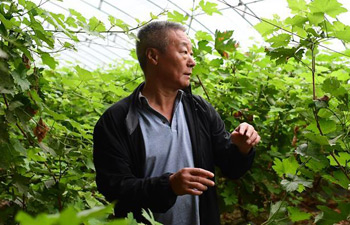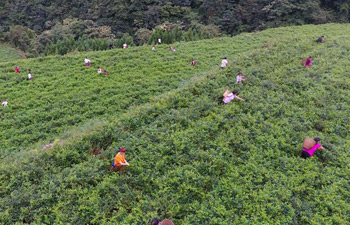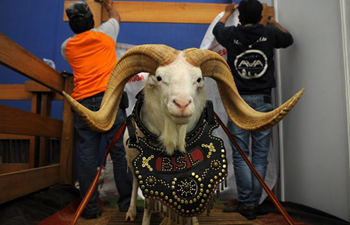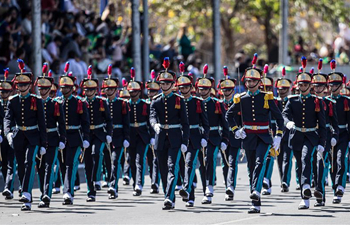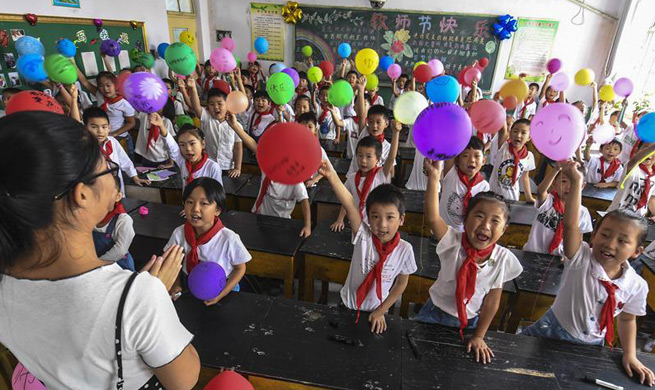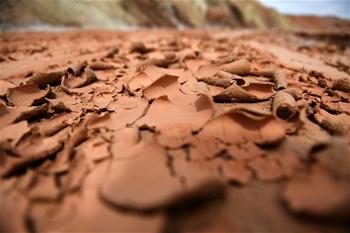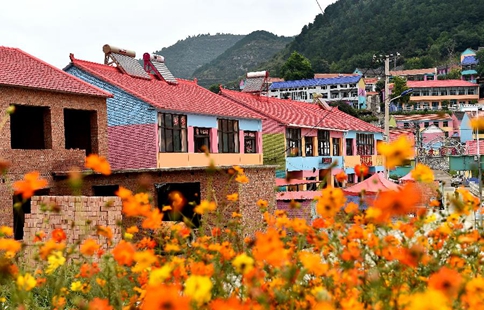URUMQI, Sept. 8 (Xinhua) -- Khuwat Sara takes a final photo with his fellow herders on the summer pasture where his ancestors have grazed for generations. He will not be back next year.
Like Khuwat Sara, 41, the other herdsmen are also bidding farewell to their traditional ways, moving on to a new life.
Khuwat Sara is of the Kyrgyz ethnic minority, living in Akto county in northwest China's Xinjiang Uygur Autonomous Region. He has always led a nomadic life, moving each summer to the pasture, 4,100 meters above sea level.
He began grazing sheep at the age of 11. Nine years later when he married, his father gave him 30 head of sheep.
"With a growing population, limited pasture and frequent natural disasters, we cannot afford to feed too many cattle," he said. "When one of my family gets ill and we have to sell our sheep at a low price, years of effort are gone."
Nomadic life means moving from place to place to make sure that sheep have enough grass to eat. The journey is often dangerous. Two years ago, when Khuwat Sara's son Jarkinal was seven, his donkey fell off a cliff.
"I cried, and was scared when dad said 'Kyrgyz men never shed tears'," he recalled.
Life carried on. Ten hours of trudging later, they arrived at the pasture, entirely cut off from the outside world, with no road, no internet, no electricity and no mobile phone signal.
Khuwat Sara has pinned his hopes on his son and sent him to a boarding school. Each weekend, Khuwat Sara and his wife walk down the mountain to call to the boy -- the journey takes two days.
"I have to live by grazing sheep, but I want my son to do better than that," the father said.
Last month, villagers were told that they are to be relocated to plains near to the county seat of Akto. The local government plans to relocate all the herdsmen, more than 20,000 of them, by 2020.
They will be provided free houses and vegetable greenhouses, and encouraged to seek work as migrants. The plateau prairie will still be part of the villagers' range but only a few men will graze for all villagers.
All the herders in Kizilto village agreed on the relocation plan at a village meeting last year. They decided to allow families with old people or small herds move first, as families with strong herders and bigger flocks can better withstand the hardship.
The plateau region of Akto is one of the 14th most impoverished area in China. It is difficult to build infrastructure to improve living conditions there. Relocation is the only realistic choice.
Memet Hoja, 30, was reluctant to go before a severe snow storm changed his mind. More than 200 sheep died overnight, and the village was out of food. He and another man, both considered the strongest in the village, took 48 hours to cut steps on the icy path and bring back four bags of grain from the nearest supply center.
Apart from harsh weather, villagers have also seen the deterioration of the pasture. When Khuwat Sara was a boy, the grass grew higher than his knees. Now the grass barely reaches his ankle.
"The pasture is bald now," he said. "It gave us everything and it is now time to let it rest."
Health is another concern. Due to the altitude, the cold and lack of oxygen, many herdsmen suffer from heart disease, rheumatism and arthritis. In the past ten years, 25 villagers died because they could not get to hospital.
After Khuwat Sara moves downhill, he will be able to sell each head of sheep in the county seat for 800 to 1,000 yuan (about 120 to 150 U.S. dollars), almost double the price in the village. He also plans to take free training laid on by the local government to learn some skills and maybe find a job in a factory.
During what might be his last visit to the pasture in his summer vacation, Jarkinal Khuwat asked his father if he could learn traditional horse racing. The request was turned down.
"I want him to change his life," said Khuwat Sara.
The village already has four university graduates. None want to pursue the pasturing lifestyle of their forefathers.
Memet Hakim was admitted to a university this year.
"I will certainly look for a city job after graduation. Young people in our village will no long allow the mountains obstruct our path to a better life."




